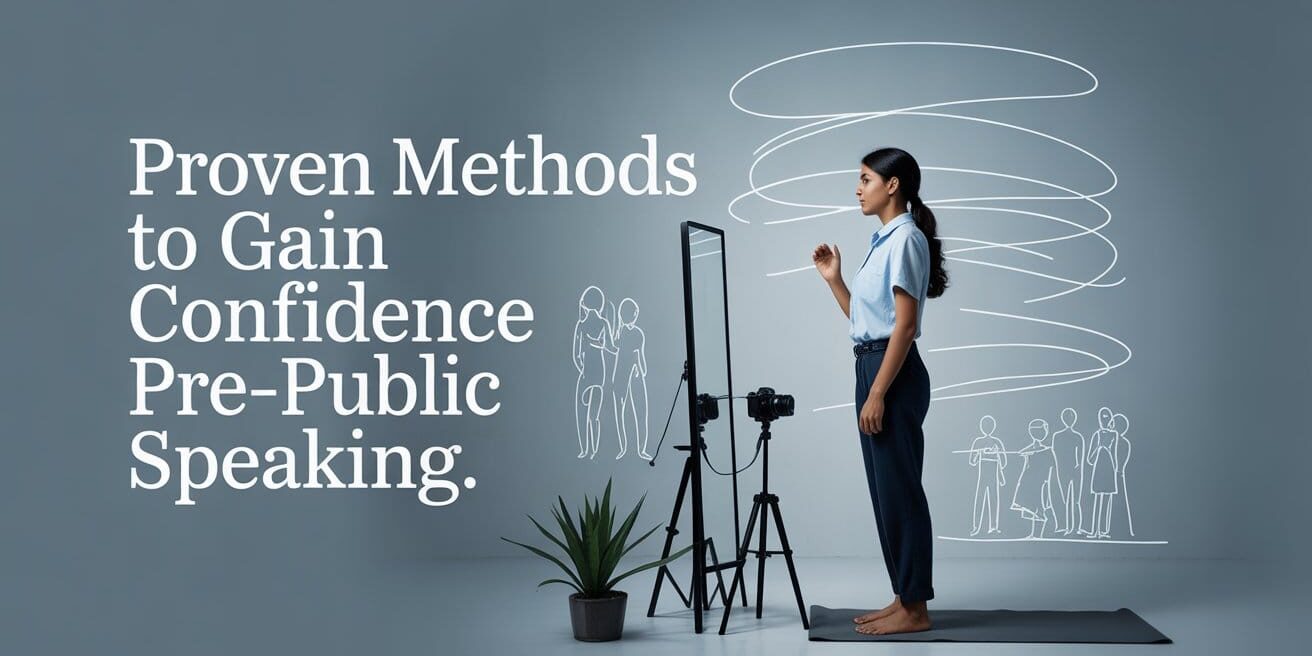Discover proven ways to gain confidence before public speaking. Simple, actionable activities for students and professionals alike.
Public speaking is not about being fearless.
It’s about stepping up with preparation, presence, and practice—even when you’re scared.
Confidence before speaking doesn’t magically appear. It’s built through small, repeatable actions that reduce anxiety and boost your belief in yourself. Whether you’re a student giving your first presentation or a young professional pitching an idea, these confidence-building activities will help you face the stage with calm and clarity.
Let’s explore the proven ways to transform your fear into focus and gain confidence before public speaking.
Why Building Confidence Matters Before Speaking
Most folks believe that public speaking fear is the result of a lack of talent.
It isn’t.
Public speaking fear results from an absence of preparation, clarity, and trust in yourself.
Confidence isn’t loud or perfect. It’s being solid in your message and knowing how to navigate the emotional rollercoaster of presenting to other human beings.
It’s also rooted in self belief—knowing you have what it takes even if your hands shake.
The good news? Confidence before public speaking can be learned. Let’s dive into how.
Proven Activities to Build Confidence Before Public Speaking
1. Full Body Awareness Mirror Practice
Stand before a mirror—not only to practice your lines but to notice how you present yourself.
- Are you slouching?
- Is your eye contact firm?
- Do your hands fidget?
Speaking before a mirror makes you notice your non-verbal communication—posture, expressions, tone—all of which determine how confident you look and feel.
Practice 5–10 minutes a day. Your presence will change.
2. Record and Review Yourself
Recording yourself is uncomfortable, but powerful.
Watching your delivery back makes you aware of pacing problems, filler words, unclear language, or nervous tics.
Most importantly, it demonstrates your improvement and builds confidence before public speaking.
With every recording, you’ll see progress, boosting your confidence for the actual thing.
Bonus: Use this to give yourself feedback or share with a mentor.
3. Power Poses and Voice Warmups
Before you take the stage, your body must be rebooted.
Try these:
- Stand with your hands on your hips for 2 minutes (power stance)
- Stretch your arms and take some deep breaths
- Do some vocal warmups, such as humming or tongue twisters, to release tension
These small rituals decrease cortisol (stress hormone) and build your internal sense of control.
Confidence is just as much physical as it is mental.
4. Begin Small: Speak Up in Low-Stakes Situations
Public speaking doesn’t start on a stage. It starts in day-to-day situations.
Wave your hand in class. Speak up in a meeting. Say hello in a group. These micro-moments are practice for your speaking muscles.
The more miniature victories you pile up, the less anxiety you will have in giant moments.
5. Imagine a Confident You—Start to Finish
Before the event, shut your eyes and mentally walk through:
- Coming on stage
- Smiling at the crowd
- Speaking plainly and calmly
- Finishing with confidence
Competitors apply visualization to prepare their minds ahead of high-stakes performances. Speakers can do the same.
If your mind has already “visualized” success, your body follows.
A Thought to Carry With You
“Courage is not the absence of fear, but the triumph over it. The confident speaker is the one who shows up despite the nerves.”
— Anonymous
Final Thoughts
You don’t have to be a born speaker to own a room.
What you require is a system—easy, repetitive actions that instruct your body and mind to remain calm, centered, and ready.
These exercises succeed not because they make fear go away, but because they substitute it with readiness —and help grow confidence before public speaking.
They’re especially helpful if you’re struggling with stage fear and want practical tools to feel more in control.
So the next time you are ready to give a speech, do not try to be fearless.
Try to be ready. That’s where confidence starts.
FAQs :
Q1. How much in advance should I prepare for a speech so that I feel confident?
Begin at least 5–7 days in advance to develop lasting confidence before public speaking. Confidence accumulates gradually, not in one night. Space out your practice in short, daily segments.
Q2. I’m articulate in practice, but go blank in public. What can I do?
Supplement your practice with audience simulation, such as recording yourself or practicing mock speeches with friends. It develops stage readiness, not mere content fluency.
Q3. Are there any apps that can improve confidence when speaking in public?
Yes. Programs such as Orai, Ummo, or PromptSmart provide instant feedback on clarity, pace, and filler words. They can be practiced alone.
Q4. Should I memorize my speech to feel more confident?
Not verbatim. Memorize the structure, major points, and transitions. Cramming increases stress and sets you off if you miss a line.
Q5. What do I do if I freeze up during my speech?
Pause. Breathe. Use phrases like “Let me rephrase that” or “Let’s move to the next point.” Most audiences won’t notice—your recovery is what counts






